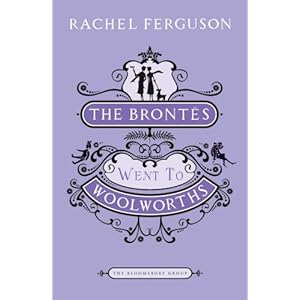 The Brontës Went to Woolworths is one of those utterly bizarre books, with quirky characters and a story which makes the mind boggle. The thin line between fact and fiction is erased by the Carne sisters - the protagonists of this book - as they let their imaginations run away with them, and create a wondrous warm world of friendship, happiness and make-believe. A dog who used to be Pope, a doll who used to live in Paris and friends in high places, including Judge Toddington ("Toddy").
You also have their mother, who indulges them and the prudish governess, Miss Martin, who judges them, as she can't quite fathom what's going on inside the bubble the family has created for themselves, probably to cope with grief and sadness after their father's unfortunate demise. To be fair, one can't really blame Miss Martin for being confused about what's going on in this 1930s household - I was utterly baffled by what was going on for the first fifty odd pages, and I kind-of had an inkling of a clue. However, once I figured out the line that the Carnes had erased, things suddenly became much clearer...
The Brontës Went to Woolworths is one of those utterly bizarre books, with quirky characters and a story which makes the mind boggle. The thin line between fact and fiction is erased by the Carne sisters - the protagonists of this book - as they let their imaginations run away with them, and create a wondrous warm world of friendship, happiness and make-believe. A dog who used to be Pope, a doll who used to live in Paris and friends in high places, including Judge Toddington ("Toddy").
You also have their mother, who indulges them and the prudish governess, Miss Martin, who judges them, as she can't quite fathom what's going on inside the bubble the family has created for themselves, probably to cope with grief and sadness after their father's unfortunate demise. To be fair, one can't really blame Miss Martin for being confused about what's going on in this 1930s household - I was utterly baffled by what was going on for the first fifty odd pages, and I kind-of had an inkling of a clue. However, once I figured out the line that the Carnes had erased, things suddenly became much clearer...
...and while they became clear in my head, things got slightly more complicated for the Carnes, when Deirdre (the eldest sister) met Lady Mildred (Toddy's wife) at a charity bazaar, and ended up befriending the older lady and subsequently, her husband - the father figure that Deirdre had created for herself. The "Saga" the Carnes had created for themselves was suddenly moving closer towards reality, and the emotions that ran through the book were both, endearing and heart-rending. Shiel, the youngest daughter, practically had no grip on reality, and her older sisters were extremely protective of her - not only that, but, they themselves spent most of their time in the nursery, escaping their own reality.
The other thing I loved about this book was the irony and humour present throughout. There were a fair few chunks that had be laughing out loud. For instance, the opening paragraph, as narrated by Deirdre, reads:
How I loathe that kind of novel which is about a lot of sisters. It is usually called They Were Seven, or Three-Not Out, and one spends one’s entire time trying to sort them all, and muttering, ‘Was it Isobel who drank, or Gertie? And which was it who ran away with the gigolo, Amy or Pauline? And which of their separate husbands was Lionel, Isobel’s or Amy’s?
How can you not love the irony, when this book is about the three sisters, for the most part?
Another bit that absolutely had me in splits was when Deirdre talks about a proposal she received:
I couldn't accept the man, much as I liked him, because I was in love with Sherlock Holmes. For Holmes and his personality and brain I had a force of feeling which, for the time, converted living men to shadows.
I did enjoy this book thoroughly, and would recommend it highly. It's not very twenty-first century, though, so it's almost like a fairytale. The cynic in me did kick in from time to time, but, I just brushed it aside, for I couldn't help but hope for a "happy ending" for the kooky family, that resorted to escapism to find their solace.
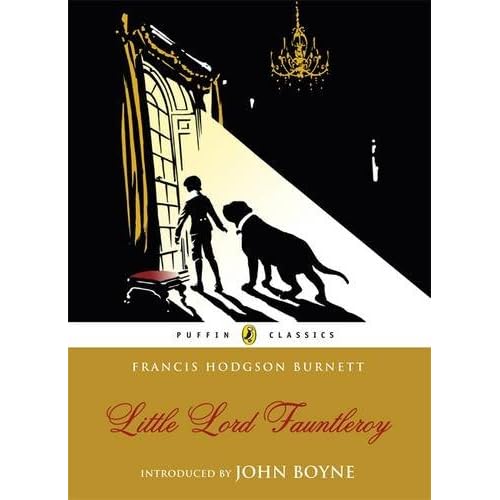 I finally have some semblance of a life again after being under the weather for an extraordinarily long time (well, "extraordinarily long" is a relative term, but it is coming up to about two months now). I read loads of my old Enid Blytons and Nancy Drews, while twiddling my thumbs and imagining all kinds of crazy things, but most of them were being re-read for about the seven hundred and twenty third time. I can actually recite some of those books without any prompts...
Right, that's a long digressive opening paragraph, which is meant to lead up to this simple statement : the only children's book (comfort read) I read during this period which I hadn't read before was Frances Hodgson Burnett's Little Lord Fauntleroy. I absolutely loved both, The Secret Garden and A Little Princess, but I'd just never managed to find this book anywhere before. Hurrah for libraries!
I finally have some semblance of a life again after being under the weather for an extraordinarily long time (well, "extraordinarily long" is a relative term, but it is coming up to about two months now). I read loads of my old Enid Blytons and Nancy Drews, while twiddling my thumbs and imagining all kinds of crazy things, but most of them were being re-read for about the seven hundred and twenty third time. I can actually recite some of those books without any prompts...
Right, that's a long digressive opening paragraph, which is meant to lead up to this simple statement : the only children's book (comfort read) I read during this period which I hadn't read before was Frances Hodgson Burnett's Little Lord Fauntleroy. I absolutely loved both, The Secret Garden and A Little Princess, but I'd just never managed to find this book anywhere before. Hurrah for libraries!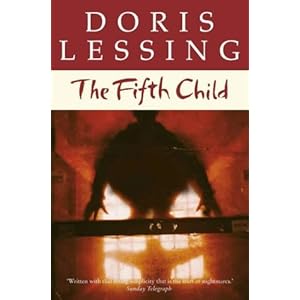 By virtue of Doris Lessing being a Nobel Laureate, her books have always intimidated me. The size of the one book I've heard about the most, The Golden Notebook, hasn't really helped. However, when I stumbled upon The Fifth Child at the library, I felt as though I had to try reading at least one of her books. I've read
By virtue of Doris Lessing being a Nobel Laureate, her books have always intimidated me. The size of the one book I've heard about the most, The Golden Notebook, hasn't really helped. However, when I stumbled upon The Fifth Child at the library, I felt as though I had to try reading at least one of her books. I've read 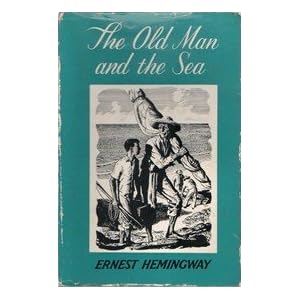 I have an absolutely ancient copy of this book lying around, and it's actually bizarre that I've not read the book yet - it's just 114 pages long! Published in 1974, the book cost just 30p at the time (US$0.45)! The book costs £7.99 now... let's keep that musing for another day!
The Old Man and the Sea is an extremely 'concise' book, for the lack of a better word. The plot is uncomplicated, with minimal dialogue. It's literally about an old man and the sea, as the old man (Santiago) tries to change his luck, after going eighty-four days without catching a fish.
I have an absolutely ancient copy of this book lying around, and it's actually bizarre that I've not read the book yet - it's just 114 pages long! Published in 1974, the book cost just 30p at the time (US$0.45)! The book costs £7.99 now... let's keep that musing for another day!
The Old Man and the Sea is an extremely 'concise' book, for the lack of a better word. The plot is uncomplicated, with minimal dialogue. It's literally about an old man and the sea, as the old man (Santiago) tries to change his luck, after going eighty-four days without catching a fish.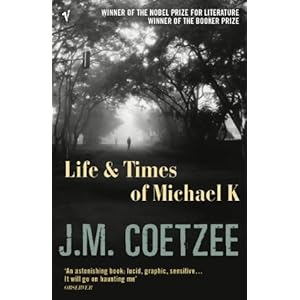 Life and Times of Michael K won the Booker Prize in 1983, and it's been one of Coetzee's books that I've wanted to read for a really long time. The name intrigued me: who is Michael K? And, what is it about his life and times that merits a novel?
Life and Times of Michael K won the Booker Prize in 1983, and it's been one of Coetzee's books that I've wanted to read for a really long time. The name intrigued me: who is Michael K? And, what is it about his life and times that merits a novel?
 I loved The Thorn Birds when I read it, almost ten years ago. Never went near another book by Colleen McCullough after that, as I was scared it would ruin The Thorn Birds for me. However, while browsing around at the library, I saw a fair few books by McCullough, and decided to take the plunge. So happy that I did - I loved this book!
It's a diary of twenty-one year old Harriet Purcell in the 1960s. An X- Ray technician, Harriet's engaged to the boy she's been dating for a long time (but he doesn't even kiss with his mouth open!), and she shares a bedroom with her grandmother.
I loved The Thorn Birds when I read it, almost ten years ago. Never went near another book by Colleen McCullough after that, as I was scared it would ruin The Thorn Birds for me. However, while browsing around at the library, I saw a fair few books by McCullough, and decided to take the plunge. So happy that I did - I loved this book!
It's a diary of twenty-one year old Harriet Purcell in the 1960s. An X- Ray technician, Harriet's engaged to the boy she's been dating for a long time (but he doesn't even kiss with his mouth open!), and she shares a bedroom with her grandmother. Oh, it's been absolutely ages since I've read a 470+ page book in a day, but boy, this one was absolutely worth it. It's been labeled "wicked", "sordid" and even "cheap". I half thought of
Oh, it's been absolutely ages since I've read a 470+ page book in a day, but boy, this one was absolutely worth it. It's been labeled "wicked", "sordid" and even "cheap". I half thought of 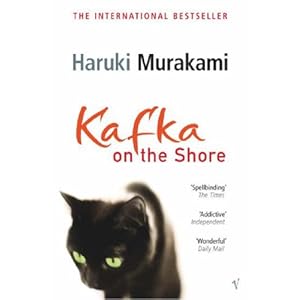 Surrealism. I've reached the conclusion that it's the only word that can be used to describe Murakami's books. Kafka on the Shore is no exception. Leeches and fish rain down, there's a character called Johnnie Walker, and another called Colonel Saunders (of Kentucky Fried Chicken fame), a mysterious childhood "accident" results in one of the characters being able to speak to cats, and there's a portal to a parallel universe.
The book follows two characters in interleaving chapters: Fifteen year old runaway, Kafka Tamura and Nakata, an elderly man who is considered "dumb" by most as he is unable to read or write. While neither of them are aware of the other's existence, there's a greater (almost supernatural) force that connects them.
Surrealism. I've reached the conclusion that it's the only word that can be used to describe Murakami's books. Kafka on the Shore is no exception. Leeches and fish rain down, there's a character called Johnnie Walker, and another called Colonel Saunders (of Kentucky Fried Chicken fame), a mysterious childhood "accident" results in one of the characters being able to speak to cats, and there's a portal to a parallel universe.
The book follows two characters in interleaving chapters: Fifteen year old runaway, Kafka Tamura and Nakata, an elderly man who is considered "dumb" by most as he is unable to read or write. While neither of them are aware of the other's existence, there's a greater (almost supernatural) force that connects them. Note: Kafka on the Shore is the first Murakami I ever had on my shelf. It was given to me as a present sometime in 2008, and I kept "saving it" for the right occasion. I planned on reading it when I went on
Note: Kafka on the Shore is the first Murakami I ever had on my shelf. It was given to me as a present sometime in 2008, and I kept "saving it" for the right occasion. I planned on reading it when I went on 
 Ludo, born in the favela of Heliopolis (a shantytown), is "lucky." He's escaped a life of squalor, on being formally adopted by the extremely rich Carnicelli family, who have also hired his mother as a cook in their farmhouse.
Ludo, born in the favela of Heliopolis (a shantytown), is "lucky." He's escaped a life of squalor, on being formally adopted by the extremely rich Carnicelli family, who have also hired his mother as a cook in their farmhouse.
 There's a thin line between reality and fiction; they oft' reflect each other very closely, so much so that the line is indiscernible. But - what happens when reality starts imitating fiction?
That's the basic premise of Spark's 1981 novel, starring Fleur Talbot: an aspiring writer in London in the 1950s. She's writing her first novel, Warrender Chase, but she needs a job to get by while she finishes it. And so, she takes up the position of the secretary to Sir Quentin Oliver, and his brainchild: The Autobiographical Association.
There's a thin line between reality and fiction; they oft' reflect each other very closely, so much so that the line is indiscernible. But - what happens when reality starts imitating fiction?
That's the basic premise of Spark's 1981 novel, starring Fleur Talbot: an aspiring writer in London in the 1950s. She's writing her first novel, Warrender Chase, but she needs a job to get by while she finishes it. And so, she takes up the position of the secretary to Sir Quentin Oliver, and his brainchild: The Autobiographical Association. In a world where twenty-seven year old women are called "spinsters" and they aren't allowed to study further, despite being inclined towards academia, where they still need their mother's permission to carry out certain activities, and where they're bound by society's rules and regulations, this story is about a woman desperately trying to find her place and her footing while her siblings are getting married, having babies and moving ahead.
It's also a story about another woman, a spiritualist, who has been imprisoned due to her involvement in an affair which led to the unfortunate demise of one of her clients. She blames it on the spirits who she interacts with, but there isn't any evidence in her favour.
In a world where twenty-seven year old women are called "spinsters" and they aren't allowed to study further, despite being inclined towards academia, where they still need their mother's permission to carry out certain activities, and where they're bound by society's rules and regulations, this story is about a woman desperately trying to find her place and her footing while her siblings are getting married, having babies and moving ahead.
It's also a story about another woman, a spiritualist, who has been imprisoned due to her involvement in an affair which led to the unfortunate demise of one of her clients. She blames it on the spirits who she interacts with, but there isn't any evidence in her favour.